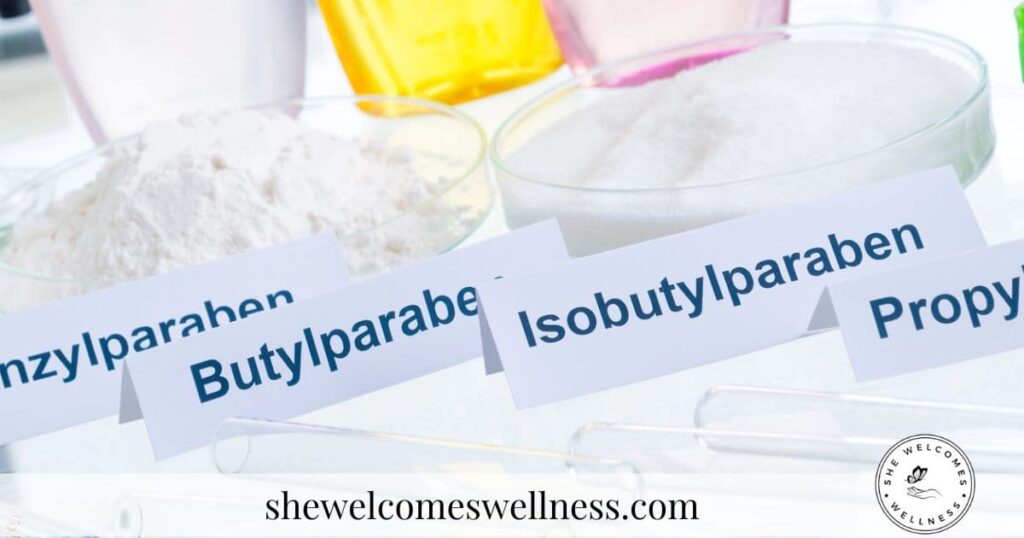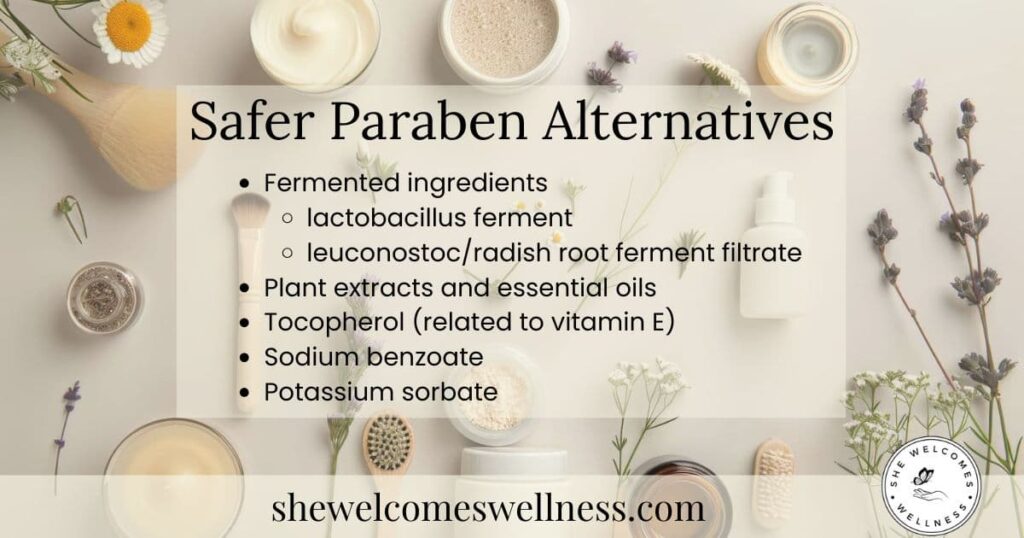When you’re reaching for your favorite lotion, face wash, or even mascara, parabens probably aren’t top of mind. But these sneaky preservatives hide in thousands of personal care products.
And the dangers of parabens are very real, from hormone disruption to skin irritation. It’s confusing and honestly a little discouraging when every label seems to say something different, and even “paraben-free” isn’t always what it seems.
So what are parabens, why are they used so widely, and what’s the risk of using them every day?
The good news is that finding safer paraben alternatives doesn’t have to be overwhelming.
And even better, recent research shows that reducing your exposure might actually help your body repair and protect itself on a deeper level. (More on that later.)
It’s definitely worth it to ditch parabens!
Today, I’m breaking down what parabens are and why they’re a problem. I’ll also share safer paraben alternatives so you can make confident, empowered swaps without the guesswork.
📌 Don’t forget to pin for later. 👇🏼

*This post contains affiliate links, which means I may receive a commission if you purchase through my links (at no extra cost to you). As an Amazon Associate, I earn from qualifying purchases. As a Counter Brand Partner, I may earn commissions from qualifying purchases made through my links. Please read my full disclosure and Affiliate Disclosure for more information.
Table of Contents
ToggleWhat Are Parabens?
Parabens are a group of synthetic preservatives used to prevent bacteria, mold, and yeast from growing in personal care and cosmetic products.
You’ll usually see them listed as methylparaben, propylparaben, butylparaben, or ethylparaben.
And they’re sometimes even hidden under terms like “fragrance” or “preservative blend.”
Chemically, they’re esters of para-hydroxybenzoic acid.
They’re used because they’re cheap, effective, and extend shelf life.
But that convenience comes at a cost.
Hidden Dangers of Parabens

Parabens are used to help prevent products from spoiling.
But research shows they’re endocrine disruptors, which are chemicals that mimic estrogen and interfere with hormone balance in the body.
Here are some more specific reasons to avoid them.
Hormone Disruption and Reproductive Health
Parabens can disrupt your hormones, especially reproductive hormones like estrogen.
Studies have linked higher levels of methylparaben and propylparaben in urine to lower reproductive hormone levels in women.
Other research shows that women with more parabens in their system had a higher risk of infertility.
Breast Cancer Concerns
Parabens have been found in breast tissue tumors, raising concerns about their role in cancer.
New research suggests parabens may act like estrogen, potentially helping certain breast cancer cells grow and spread.
Broader Health Effects
A recent 2023 study linked urinary parabens to elevated blood pressure risk in a group of Chinese women and men. This points to wider hormonal disruption.
Other studies show parabens may cause skin allergies and even affect organs like the liver.
Environmental Impact
Parabens aren’t just a personal health issue.
They’ve been found in rivers and marine life and are difficult to remove through typical water treatment processes.
How They Sneak Into Your Routine
Parabens are easily absorbed through the skin, especially from leave-on products like lotions and deodorants.
Thanks to the fragrance loophole, parabens can still be hiding in products labeled “paraben-free.” Under the “fragrance” umbrella, companies can keep those “Trade Secret” ingredients hidden.
And here’s the kicker: the term “paraben-free” is not regulated or officially defined by the FDA or any other U.S. authority.
So even “paraben-free” products can still contain parabens—because the term isn’t regulated, and the fragrance loophole.*
👉 And even when parabens are removed, they’re often replaced with other concerning preservatives like methylisothiazolinone (MI) and methylchloroisothiazolinone (MCI)—which have been linked to allergic reactions and skin irritation.
What Happens When You Ditch Parabens
This study shared some really hopeful news.
Researchers worked with a group of healthy women who stopped using daily-care products—like lotions or shampoos—that contain parabens and phthalates for four weeks.
Before and after this 28-day break, doctors took breast tissue samples to check what was happening at a microscopic level. They also took urine samples.
What they discovered:
- The breast tissue began to show healthy changes at a cellular level—essentially “undoing” patterns linked to cancer growth.
- Urine tests also showed their bodies had less of these chemicals in their system.
What this means:
By simply switching to products without these chemicals, the women’s breast cells started reversing cancer-related traits. It shows that small changes—like swapping your shampoo or deodorant—can actually help your body protect itself.
Where Parabens Might Be Hiding
Parabens are incredibly common. They are found in both personal care and household products.
Here are some of the places you’ll find them:
- Moisturizers and face creams
- Shampoos, conditioners, and hairstyling products
- Makeup (foundation, mascara, blush)
- Deodorants
- Shaving gels
- Sunscreens
- Baby products
- Household cleaners and air fresheners
- Products with “fragrance”
- Even in products labeled “paraben-free” (see above)
Watch out for greenwashing: Unless a brand discloses all ingredients and fragrance components, there’s no way to know what’s inside.
Safer Paraben Alternatives

You don’t have to memorize every paraben name. Just start by scanning labels for anything that ends in “-paraben” and steer clear.
Instead, choose products that use natural preservatives like:
- Fermented ingredients
- lactobacillus ferment
- leuconostoc/radish root ferment filtrate
- lactobacillus ferment
- Plant extracts and essential oils
- Tocopherol (related to vitamin E)
- Sodium benzoate
- Potassium sorbate
Look for: Brands that fully list every ingredient on the label—including what’s in the “fragrance”—and have a clear list of ingredients they never use.
Certifications like EWG Verified can be helpful, but what really matters is honest, no-fluff ingredient transparency.
This is one of the reasons I love Counter (formerly known as Beautycounter) so much!
They have a robust Never List that goes beyond industry standards. You always know exactly what you’re putting on your skin.
Counter launched on June 25. Check out this post to get all the details.
The Bottom Line
Parabens may help keep products shelf-stable, but they don’t belong on your skin. Especially when safer alternatives exist.
You don’t need to be perfect or overhaul everything overnight.
Just start small: check labels, get curious, and aim for better—not all at once, just one step at a time.
And if you’re feeling stuck or overwhelmed, you don’t have to figure it out alone.
And if you’re not sure where to begin with your skincare? I’ve got you.
Take My Skincare Quiz to get personalized, safer product recommendations. I’ll email you a curated cart with specific clean products tailored to your skin, your needs, and your budget.